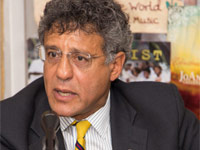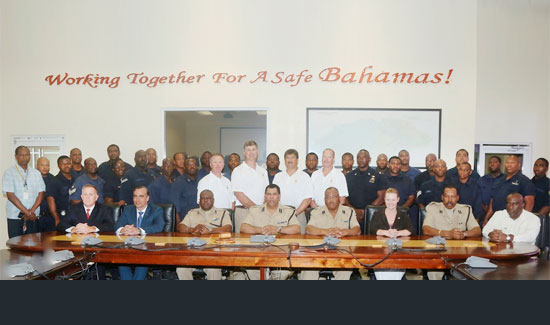Nassau, The Bahamas – The phenomenon of the future of global energy production was experienced in the June 13 training seminar at the Bahamas Electricity Corporation compound on Blue Hill Road.
Participants for the BEC sponsored Solar Photovoltaic (SPV) Systems installation-training seminar included local private sector contractors and government workers from BEC, Ministry of Housing, Department of Environment Health and the Ministry of Works.
The trainees were told about the energy potential The Bahamas could engage in to reduce the nation’s carbon footprint and consumption, which translates into reduced demand on BEC generators.
“All of you know, as Bahamians, that we have a lot of natural resources,” said Phenton Neymour, Minister of State for the Environment.
“We have a lot of sun. We have the ocean right at our feet and also there’s a considerable amount of wind. We decided to look at the possibility of renewable energy throughout The Bahamas and this study basically looked at each major island throughout The Bahamas and looked at the potential for each particular island,”
“For instance if we look at wind, we know that wind is best in the Southeast Bahamas. So that is a resource we can look at. Solar could be used throughout The Bahamas. But what was interesting is that it was determined that the most viable source of renewable energy throughout The Bahamas was that of using biomass, in other words, using our pine, primarily in the islands of Andros, Eleuthera, Abaco, and Grand Bahama. That is a resource available to us.”
The trainees also learned about the study conducted by the IDB and the GEF. They discovered that The Bahamas has enough natural resources to operate the new energy-storing and distribution technology being developed for the global market.
“They also found that it was possible for us to use photovoltaic systems. Not necessarily now because the prices are very high, but it is recognised with improving technology, in short order, photovoltaic systems will be more financially viable in The Bahamas,” said Mr. Neymour.
“As part of this entire process, we feel that it is important that as a government we be proactive in the energy sector. We requested that we look at ways in which to quickly and essentially make the biggest bang for the buck. Many of the activities we began a number of years ago, remember we offered free energy audits and some 700 plus individuals benefitted from that. We went into homes, looked at the energy they consumed and looked at ways in which to reduce their energy bills.
“That energy audit programme, although it was a job employment programme, was in fact one of the first initiatives of this IDB study. The intent was to look at ways to quickly get into homes. When we looked into homes, we saw that particularly with the low-income families that were having trouble meeting their electrical costs, the biggest energy consumption was in the area of lighting,” said Mr. Neymour.
Minister Neymour explained the methodology behind the energy audits was to document a sample of Bahamian energy consumption habits in order to put into practice the government implementing the Sustainable Energy Projects Programme, a pilot project sponsored by the Inter-Developmental Bank (IDB).
“Now, the grant was for four million dollars and a small portion of that was used to purchase some 270,000 compact fluorescent lightbulbs (CFLs), we have distributed so far somewhere in the region of 230,000 to Bahamians throughout The Bahamas. Also, as a part of that grant was the Solar Water Heater Initiative,” said Mr. Neymour.
“Barbados has an excellent programme in which using solar water heaters are a part of their building code. And it was recognised with our great potential, in regards to solar, that Bahamians can purchase these solar water heaters and can receive a return on them after two to three years. They cost about $3,500 to install, depending on the system that you use.”
The government procured 134 solar water heaters and are putting 34 of them into government low-cost housing as part of the IDB pilot project. They have begun the installation and training of government contractors and BTVI renewable energy instructors to provide more technical skill in installing these systems.
“One hundred of those solar water heaters will be distributed throughout The Bahamas through an equitable process. Essentially we are going to raffle them off to Bahamians with a view of using it as a pilot programme, so that we will analyse and review their accounts, to see the benefits they received from solar water heaters,” said Mr. Neymour.
“We will be using the same type of system for these 33 photovoltaic systems that you are now going to receive training for. However there are some conditions to qualify for it. Individuals will be required to pay for its installation, particularly for the solar water heaters and the photovoltaic system.”
By Gena Gibbs
BAHAMAS INFORMATION SERVICES



